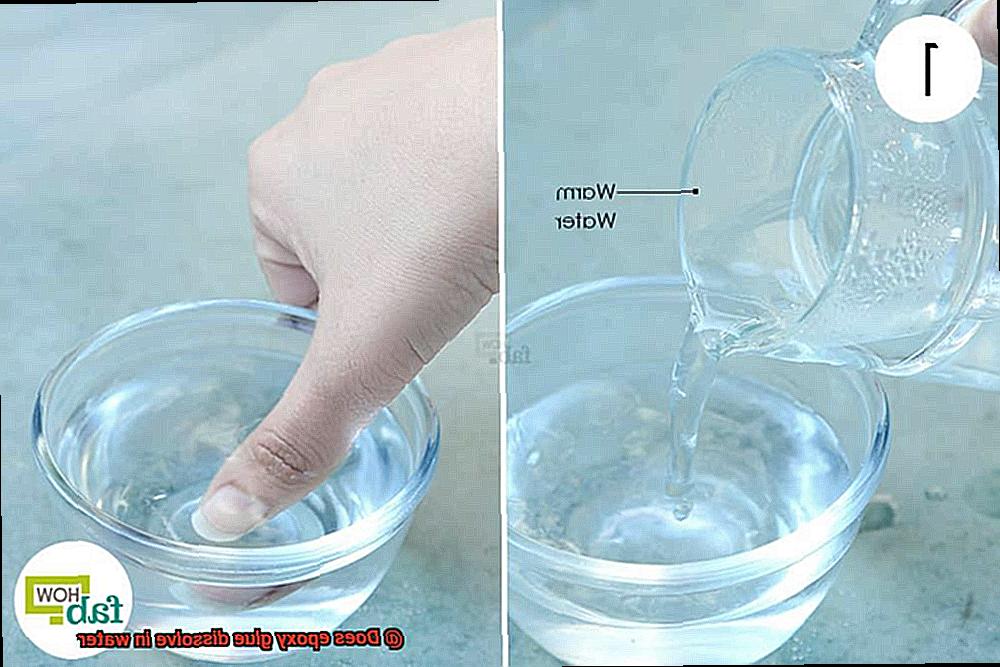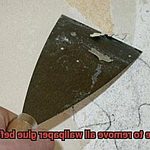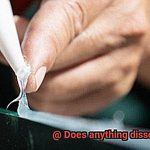Do you know the feeling of trying to remove an epoxy adhesive that just won’t budge with water? Or have you ever wondered if epoxy glue dissolves when submerged in water? Well, my dear reader, as an epoxy glue expert, I’ve received countless queries about this very question.
Epoxy glue is a versatile and strong adhesive that finds use in various applications, but it’s natural to wonder if it will disintegrate when exposed to water. The answer is not as simple as a ‘yes’ or ‘no’. It depends on several factors, which we’ll explore in this article.
Let’s start by delving into what epoxy glue is and how it works as an adhesive. Then, we’ll discuss the factors that determine whether it dissolves in water or not. These include the type of epoxy glue used, the temperature of the water, and the duration of water exposure. We’ll also touch on various ways to remove epoxy glue if it does not dissolve in water.
This article is your comprehensive guide to everything you need to know about whether epoxy glue dissolves in water or not. So sit tight and join me on this quest to unravel the mysteries of epoxy glue and water.
What is Epoxy Glue?
Contents
Epoxy glue is a versatile and powerful adhesive that is known for its exceptional strength and durability. This adhesive is made up of two parts – a resin and a hardener – that are mixed together to create a chemical reaction, resulting in a hard and rigid substance. This unique composition makes it an excellent choice for a wide range of applications in industries such as construction, automotive, and aerospace, as well as for household repairs and crafting projects.
One of the key features of epoxy glue is its water resistance. Unlike other adhesives that may dissolve or weaken when exposed to moisture, epoxy glue can actually become stronger when wet. This makes it an ideal choice for projects that will be exposed to water or other liquids, such as boat building or plumbing repairs.
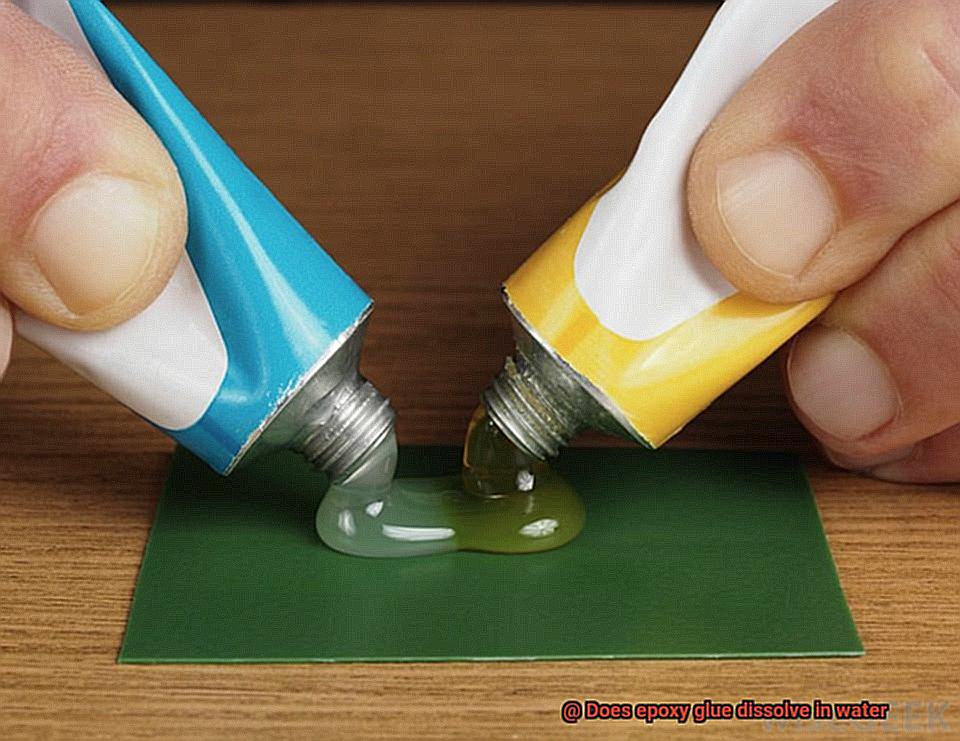
In addition to its impressive water-resistant properties, epoxy glue is also highly resistant to chemicals. It can withstand harsh environments where other adhesives may break down or corrode, making it an excellent choice for industrial applications.
Epoxy glue can bond a wide range of materials such as metals, plastics, ceramics, and wood. Its versatility makes it a go-to option for various projects where strong and long-lasting bonding solutions are required.
It’s important to note that while epoxy glue is water-resistant, prolonged exposure to water can cause the bond between the surfaces it’s holding together to weaken over time. Different types of epoxy glues may also have varying degrees of water resistance, so choosing the right adhesive for your specific project is crucial.
Does Epoxy Glue Dissolve in Water?
Epoxy glue is a remarkable adhesive that can bond a wide range of materials such as wood, metal, and plastic. However, when it comes to its compatibility with water, the answer is not as simple as yes or no.
The composition of epoxy glue determines its ability to withstand water. Some types of epoxy glue are designed for indoor use only and may dissolve or weaken when exposed to water or moisture. On the other hand, waterproof epoxy glue is resistant to water and moisture and can withstand prolonged exposure.
To determine if your epoxy glue is waterproof, check the manufacturer’s instructions or label. If it indicates that the glue is water-resistant, then you can use it confidently. But if it doesn’t specify its water-resistance capability, it may not be suitable for projects involving water.
The duration of exposure to water also plays a crucial role in determining if epoxy glue will dissolve or weaken. Short-term exposure may not have a significant impact on the glue’s strength and durability. However, prolonged exposure can cause the glue to soften, break down, or lose its bonding power over time.
The Effects of Water on Epoxy Glue
Epoxy glue is a versatile adhesive that can bond different materials together, but its relationship with water is complex. As an expert on the effects of water on epoxy glue, let me share with you the nuances of this fascinating topic.
Firstly, epoxy glue does not dissolve in water. This is because it is a thermosetting polymer that undergoes a chemical reaction when mixed with a hardener. The result of this reaction is a strong and durable bond that can resist moisture and other liquids.
However, prolonged exposure to water can weaken the bond over time, especially if the water is hot or contains chemicals like chlorine or salt. Water can penetrate the surface of the epoxy and cause it to swell or soften, leading to cracks and delamination.
To prevent this from happening, it’s crucial to use waterproof epoxies for projects that will be exposed to water. Waterproof epoxies are specially formulated to resist moisture and other liquids, making them ideal for boat repair or plumbing applications. It’s also vital to prepare the surface properly before applying epoxy to ensure maximum adhesion and durability. This includes thoroughly cleaning the surface and roughing it up with sandpaper so that the epoxy has something to grip onto.
Different Types of Epoxy Glues
Epoxy glue is a versatile adhesive that is widely used in construction, woodworking, and automotive industries due to its strong bonding properties. However, not all epoxy glues are the same. There are different types of epoxy glues available in the market, each with its unique properties and applications. Here are five sub-sections explaining the different types of epoxy glues available on the market and their various applications.
Standard Epoxy Glue
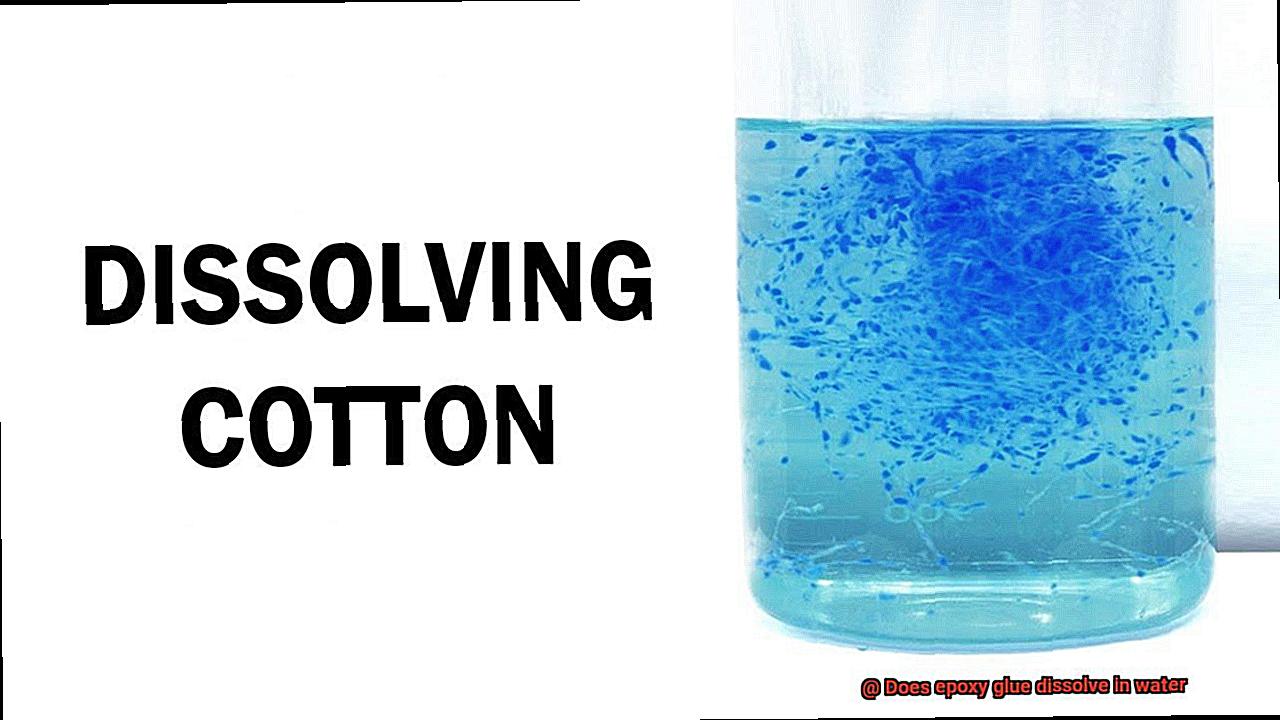
This is the most commonly used type of epoxy glue. It consists of two parts – the resin and hardener. Standard epoxy glue has a long curing time and can take up to 24 hours to cure fully. It is suitable for use on various surfaces, including metal, wood, plastic, and ceramic. It’s known for its excellent adhesive properties and can create a strong bond that lasts.
Fast-Curing Epoxy Glue
This adhesive cures quickly and can set in as little as five minutes. It’s perfect for small projects that require a quick fix. However, it has weaker bonding properties compared to standard epoxy and is not suitable for heavy-duty applications.
Heat-Resistant Epoxy Glue
These adhesives can withstand high temperatures without breaking down or losing their adhesive properties. Heat-resistant epoxy glues are commonly used in automotive and aerospace industries where high temperatures are prevalent, making them ideal for bonding metal parts that are exposed to high heat.
Marine Epoxy Glue
This type of epoxy glue is designed specifically for use in marine environments where exposure to water and salt can cause other types of adhesives to fail. Marine epoxy glue creates a strong, waterproof bond that can withstand the harsh conditions of the ocean.
Clear and Colored Epoxy Glues
Clear epoxy glue dries transparent, making it ideal for projects where aesthetics are essential. Colored epoxy glue comes in different shades and can be used to create unique designs or patterns on surfaces. They are ideal for use in art and craft projects.
Using Epoxy Glue in Wet Environments
Epoxy glue is a versatile adhesive that can be used in various applications due to its strength and durability. However, when it comes to using epoxy glue in wet environments, there are some important factors to consider.
First and foremost, it’s important to choose an epoxy glue that is specifically designed for use in wet environments. These specialized adhesives have added waterproofing properties that make them more resistant to water damage and breakdown. This means that they can withstand prolonged exposure to moisture without compromising their strength.
When using epoxy glue in wet environments, it’s also crucial to properly prepare the surfaces being bonded. Any moisture on the surface can affect the adhesive’s ability to bond correctly and reduce its overall strength. Therefore, make sure the surfaces are completely dry before applying the epoxy glue. This will ensure a strong and long-lasting bond even in damp conditions.
It’s worth noting that while epoxy glue can withstand some exposure to water, it’s not recommended for prolonged wet environments or underwater applications. For such situations, there are specialized waterproof epoxy adhesives available that offer greater protection against water damage. These adhesives are specifically designed to withstand constant exposure to water and can provide a strong bond even in challenging conditions.
How to Choose the Right Adhesive for Your Project
When embarking on a DIY project, choosing the right adhesive is crucial for its success. With so many options available, it can be overwhelming to know where to start. To help you out, here are five factors to consider when selecting the right adhesive for your project.
Material Compatibility
The first thing to consider is the materials you will be bonding together. Different adhesives are designed for different materials, so it’s important to choose an adhesive that is compatible with both surfaces. For example, if you are bonding wood, a wood glue like Titebond would work perfectly.
Strength
The strength of the bond required for your project is another important factor to consider. Some adhesives offer stronger bonds than others, and some are designed for specific applications like high-temperature environments or outdoor use.
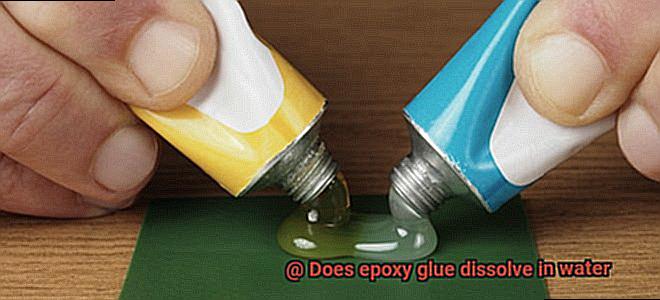
Curing Time
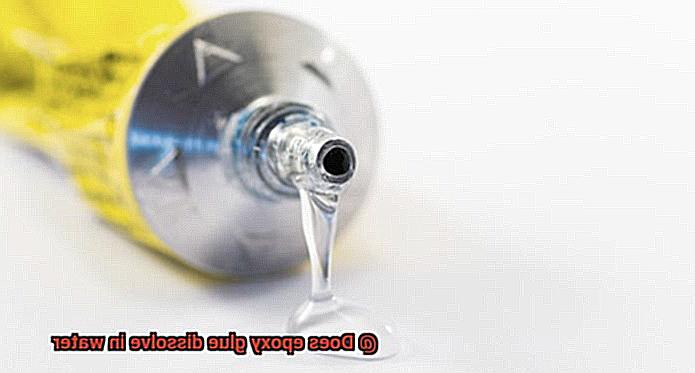
Adhesives have varying curing times, which can impact the amount of time you have to work with the adhesive before it sets. Some adhesives set quickly, while others require more time to fully cure. Consider your project timeline when selecting an adhesive.
Environment and Safety
It’s important to consider any environmental or safety concerns related to the adhesive. Some adhesives may emit harmful fumes or require special handling, so it’s crucial to read and follow all safety instructions provided by the manufacturer.
Water Resistance
If your project will be exposed to water or moisture, consider using an adhesive that is waterproof or water-resistant. For example, a marine epoxy would be ideal for repairing a boat or sealing a fish tank.
Remember to follow the manufacturer’s instructions when using any adhesive. Ensure that the surfaces being bonded are clean and free from any oils or debris, and apply the correct amount of adhesive evenly.
Tips for Applying and Curing Epoxy Glue
Epoxy glue is a powerful adhesive that can bond together a variety of materials, from metal to plastic. However, to ensure a strong and durable bond, it is crucial to apply and cure the glue properly. Here are five important tips to keep in mind when using epoxy glue:
Proper Preparation:
Before applying epoxy glue, the surfaces you want to bond must be clean and dry. Any contaminants such as dirt, dust or grease can affect the adhesive’s ability to form a strong bond. Therefore, use a mild detergent or solvent to remove any contaminants and rinse thoroughly with water. Allow the surfaces to dry completely before applying the epoxy glue.
Accurate Mixing:
Epoxy glue is a two-part adhesive that consists of a resin and a hardener. The ratio of resin to hardener can vary depending on the product, so it is important to measure accurately and mix the two components thoroughly until they are well blended. Be sure to follow the manufacturer’s instructions carefully when mixing the two components together.
Apply Enough Pressure:
When bonding two surfaces together with epoxy glue, it is crucial to apply enough pressure to ensure full contact between the surfaces. This will help create a strong and durable bond. If there are any gaps or voids in the bond, it can weaken its strength.
Allow Proper Curing Time:
Curing time for epoxy glue can vary depending on several factors such as temperature, humidity, and the thickness of the bond. Generally, it takes 24-48 hours for epoxy glue to fully cure, but some products may require longer curing times. It is important to avoid disturbing or stressing the bond during this time.
Avoid Water Exposure:
While epoxy glue is generally considered water-resistant, prolonged exposure to water can cause it to break down and lose its strength. If you need an adhesive for a project that will be exposed to water, it is best to look for a specific type of waterproof adhesive that is designed for this purpose.
YOiahRmpyy8″ >
Also Read: Will Elmer’s glue dissolve in water?
Conclusion
In conclusion, epoxy glue is a force to be reckoned with in the world of adhesives. Its incredible strength and durability make it an essential tool for any DIY enthusiast or professional. However, when it comes to its ability to dissolve in water, the answer is not as straightforward.
The type of epoxy glue used, water temperature, and duration of exposure all play a role in determining whether or not it will dissolve. To ensure success in your project, it’s crucial to choose the right adhesive based on factors such as material compatibility, strength requirements, curing time, environment and safety concerns, and water resistance.
Thankfully, there are various types of epoxy glues available that cater to specific needs. From fast-curing to heat-resistant and even marine-grade epoxy glues – each one has unique properties that make them suitable for different applications.
When working with epoxy glue in wet environments, proper preparation is key. Surfaces need to be cleaned thoroughly before application to ensure maximum bonding potential. Accurate mixing of resin and hardener components is also essential for a strong bond. Applying enough pressure while bonding surfaces together guarantees full contact between them.
It’s important not to disturb or stress bonds during the curing process as this can weaken the bond over time. Additionally, avoiding prolonged exposure to water can help maintain the strength of the bond.
In summary, understanding how different factors affect an epoxy glue’s ability to resist water will help you choose the right adhesive for your project and ensure its success.

